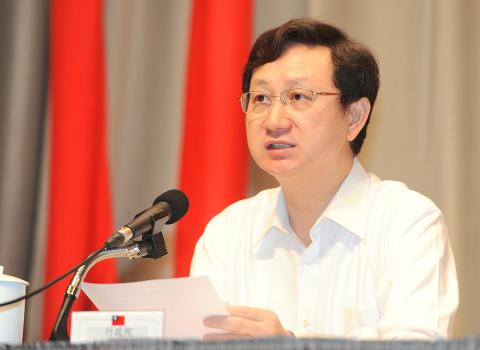The Cabinet yesterday passed amendments to the Labor Standards Act (勞動基準法) proposed by the Ministry of Labor, which would introduce “one fixed day off and one flexible rest day” — or yili yixiu (一例一休) — as two weekly days off to guarantee the realization of the 40--hour work week policy, while canceling seven days off for national holidays.
“With efforts from the Ministry of Labor, Executive Yuan staff and the Democratic Progressive Party [DPP] caucus, we have finally produced this version [of amendments]. Despite all the difficulties, it is a more feasible version that would lead to as little conflict as possible,” Premier Lin Chuan (林全) was quoted as saying by Cabinet spokesman Tung Chen-yuan (童振源) in a post-meeting news conference. “However, there are still differences of opinion, and we need to continue to communicate with the public.”
According to the ministry’s proposed amendments, employers may ask employees to work on their “fixed day off” only in the event of a natural disaster or emergency, and would have to compensate employees with double salary for the day plus an additional day off to make up for it.

Photo: Chang Chia-ming, Taipei Times
Regarding the “flexible rest day,” employers may ask employees to work after obtaining their consent, but are obligated to provide additional pay, ranging from one and one-third to one and two-thirds times the worker’s basic salary.
However, employees would not get an extra day off if they work on a “flexible rest day.”
Moreover, the proposal would also cancel seven holidays for workers to make all workers, including civil servants, enjoy the same number of national holidays.
The Cabinet’s final amendment proposals drew fire from both labor rights advocates and businesses.
Labor rights activists have been calling for two fixed days off per week and to keep the seven national holidays, while businesses have complained about the high overtime pay they have to offer employees to have them work on a “flexible rest day.”
The seven holidays that the ministry proposed to cancel were also a point of dispute as the government has revised its stance about whether to keep the holidays several times, and has been accused by labor activists of breaking its promise.
Separately, DPP caucus chief executive Wu Ping-jui (吳秉叡) said after a lunch meeting with the premier that the caucus would seek to pass the amendments in September.
“The premier would like the amendments to be passed as soon as possible, so that businesses can more accurately calculate their costs,” Wu said.
He said that not all caucus members supported the proposals, but added that working conditions would improve with the amendments, as they would require employers to provide more overtime pay and obtain consent from their employees to have them work on their rest days.

INVESTIGATION: The case is the latest instance of a DPP figure being implicated in an espionage network accused of allegedly leaking information to Chinese intelligence Democratic Progressive Party (DPP) member Ho Jen-chieh (何仁傑) was detained and held incommunicado yesterday on suspicion of spying for China during his tenure as assistant to then-minister of foreign affairs Joseph Wu (吳釗燮). The Taipei District Prosecutors’ Office said Ho was implicated during its investigation into alleged spying activities by former Presidential Office consultant Wu Shang-yu (吳尚雨). Prosecutors said there is reason to believe Ho breached the National Security Act (國家安全法) by leaking classified Ministry of Foreign Affairs information to Chinese intelligence. Following interrogation, prosecutors petitioned the Taipei District Court to detain Ho, citing concerns over potential collusion or tampering of evidence. The

‘FORM OF PROTEST’: The German Institute Taipei said it was ‘shocked’ to see Nazi symbolism used in connection with political aims as it condemned the incident Sung Chien-liang (宋建樑), who led efforts to recall Democratic Progressive Party (DPP) Legislator Lee Kun-cheng (李坤城), was released on bail of NT$80,000 yesterday amid an outcry over a Nazi armband he wore to questioning the night before. Sung arrived at the New Taipei City District Prosecutors’ Office for questioning in a recall petition forgery case on Tuesday night wearing a red armband bearing a swastika, carrying a copy of Adolf Hitler’s Mein Kampf and giving a Nazi salute. Sung left the building at 1:15am without the armband and apparently covering the book with a coat. This is a serious international scandal and Chinese

Seventy percent of middle and elementary schools now conduct English classes entirely in English, the Ministry of Education said, as it encourages schools nationwide to adopt this practice Minister of Education (MOE) Cheng Ying-yao (鄭英耀) is scheduled to present a report on the government’s bilingual education policy to the Legislative Yuan’s Education and Culture Committee today. The report would outline strategies aimed at expanding access to education, reducing regional disparities and improving talent cultivation. Implementation of bilingual education policies has varied across local governments, occasionally drawing public criticism. For example, some schools have required teachers of non-English subjects to pass English proficiency

PERSONAL DATA: The implicated KMT members allegedly compiled their petitions by copying names from party lists without the consent of the people concerned Judicial authorities searched six locations yesterday and questioned six people, including one elderly Chinese Nationalist Party (KMT) member and five KMT Youth League associates, about alleged signature forgery and fraud relating to their recall efforts against two Democratic Progressive Party (DPP) legislators. After launching a probe into alleged signature forgery and related fraud in the KMT’s recall effort, prosecutors received a number of complaints, including about one petition that had 1,748 signatures of voters whose family members said they had already passed away, and also voters who said they did not approve the use of their name, Taipei Deputy Chief Prosecutor